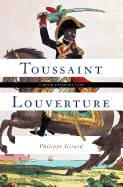
Toussaint Louverture is better known as a legend more than as a man. For many of his admirers, he was "the George Washington of his race, the black Napoléon, the new Spartacus, or even the Messiah"--the hero who fought his way from slave to international statesman as the leader of the successful Haitian revolution against the French. But he was a cautious man who kept his distance, and his contemporaries left few accounts of him.
In Toussaint Louverture, historian and author Philippe Girard (Haiti: The Tumultuous History) embraces all aspects of this ambitious, radical and contradictory leader who lived in the African, Caribbean and French worlds. "He was a slave rebel and a conservative planter, a caring father and a cold-blooded general, a passionate idealist and a scheming politician." Girard is an entertaining writer and a diligent scholar who has immersed himself in many archives to reconstruct a biography from sometimes fragmented and discordant evidence. Louverture was the Haitian-born grandchild of Benin aristocracy, and first gained his provisional freedom when he was well into his 20s. He tried various business ventures, bought and rented slaves, and even returned to work on his original plantation before age 47, when he became the elusive mastermind of the carefully planned slave revolt of 1791. He was a general, governor and diplomat before he was captured by Napoleon's forces and died at age 59 in a cold French prison cell. This is a detailed and sympathetic account of a powerful historical figure. --Sara Catterall

